Top Rankings
Three Rivers Community Schools School District ranks among the top 20% of public school district in Michigan for:
Category
Attribute
Community Size
Largest student body (number of students) (Top 1%)
For the 2025 school year, there is 1 public middle school serving 495 students in Three Rivers Community Schools School District. This district's average middle testing ranking is 6/10, which is in the top 50% of public middle schools in Michigan.
Public Middle School in Three Rivers Community School School District have an average math proficiency score of 34% (versus the Michigan public middle school average of 31%), and reading proficiency score of 39% (versus the 44% statewide average).
Minority enrollment is 28% of the student body (majority Black), which is less than the Michigan public middle school average of 42% (majority Black).
Overview
This School District
This State (MI)
# Schools
6 Schools
1,349 Schools
# Students
2,266 Students
537,315 Students
# Teachers
133 Teachers
31,652 Teachers
Student : Teacher Ratio
17:1
17:1
District Rank
Three Rivers Community Schools School District, which is ranked within the top 50% of all 851 school districts in Michigan (based off of combined math and reading proficiency testing data) for the 2021-2022 school year.
The school district's graduation rate of 85-89% has decreased from 90-94% over five school years.
Overall District Rank
#323 out of 866 school districts
(Top 50%)
(Top 50%)
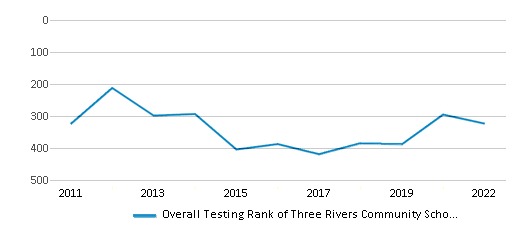
Math Test Scores (% Proficient)
38%
34%
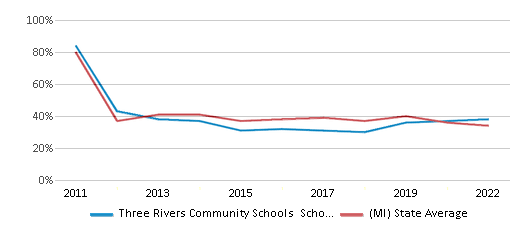
Reading/Language Arts Test Scores (% Proficient)
43%
45%
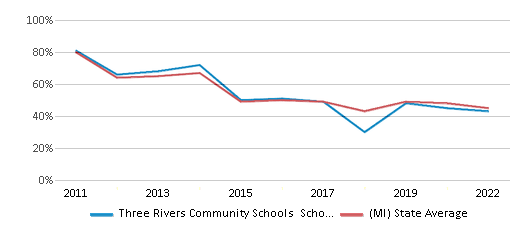
Science Test Scores (% Proficient)
40%
38%
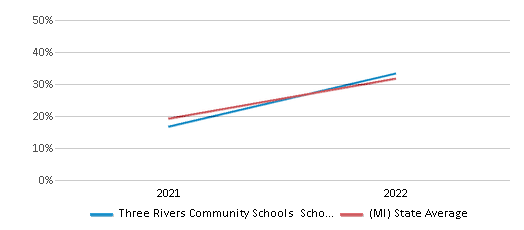
Graduation Rate
85-89%
81%
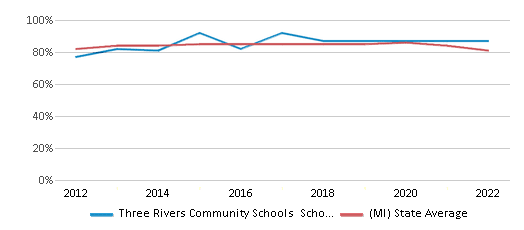
Students by Ethnicity:
Diversity Score
0.47
0.60
# American Indian Students
6 Students
5,345 Students
% American Indian Students
n/a
1%
# Asian Students
23 Students
19,936 Students
% Asian Students
1%
4%
# Hispanic Students
193 Students
47,905 Students
% Hispanic Students
9%
9%
# Black Students
199 Students
122,970 Students
% Black Students
9%
23%
# White Students
1,627 Students
312,168 Students
% White Students
72%
58%
# Hawaiian Students
6 Students
471 Students
% Hawaiian Students
n/a
n/a
# Two or more races Students
212 Students
27,717 Students
% of Two or more races Students
9%
5%
Students by Grade:
# Students in PK Grade:
-
-
# Students in K Grade:
197
17,744
# Students in 1st Grade:
174
17,631
# Students in 2nd Grade:
171
18,045
# Students in 3rd Grade:
184
17,646
# Students in 4th Grade:
194
18,813
# Students in 5th Grade:
175
26,385
# Students in 6th Grade:
150
87,228
# Students in 7th Grade:
173
103,285
# Students in 8th Grade:
172
102,692
# Students in 9th Grade:
188
33,855
# Students in 10th Grade:
166
31,157
# Students in 11th Grade:
164
30,339
# Students in 12th Grade:
158
30,343
# Ungraded Students:
-
2,152
District Revenue and Spending
The revenue/student of $15,688 in this school district is less than the state median of $18,510. The school district revenue/student has stayed relatively flat over four school years.
The school district's spending/student of $14,827 is less than the state median of $17,693. The school district spending/student has stayed relatively flat over four school years.
Total Revenue
$36 MM
$25,476 MM
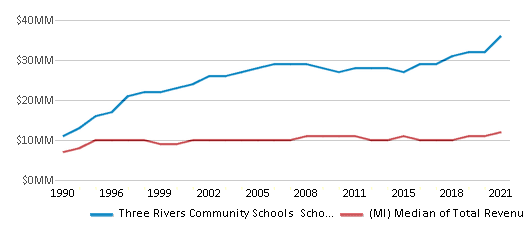
Spending
$34 MM
$24,351 MM
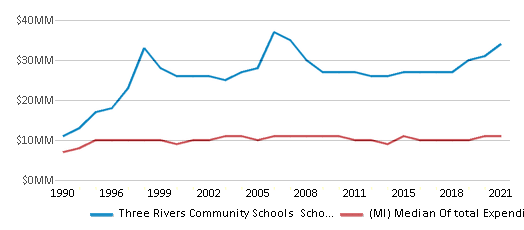
Revenue / Student
$15,688
$18,510
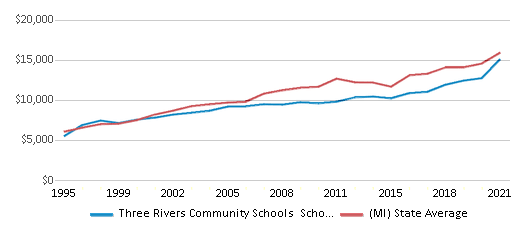
Spending / Student
$14,827
$17,693
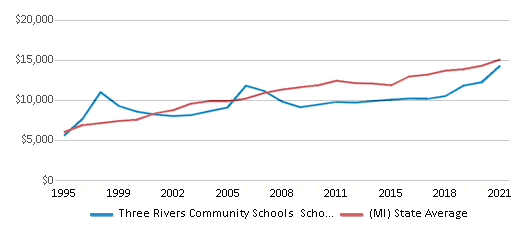
Best Three Rivers Community Schools School District Public Middle Schools (2025)
School
(Math and Reading Proficiency)
(Math and Reading Proficiency)
Location
Grades
Students
Rank: #11.
Three Rivers Middle School
(Math: 34% | Reading: 39%)
Rank:
Rank:
5/
Bottom 50%10
1101 Jefferson St
Three Rivers, MI 49093
(269) 279-1130
Three Rivers, MI 49093
(269) 279-1130
Grades: 6-8
| 495 students
Recent Articles

Year-Round Or Traditional Schedule?
Which is more appropriate for your child? A year-round attendance schedule or traditional schedule? We look at the pros and cons.

Why You Should Encourage Your Child to Join a Sports Team
Participating in team sports has a great many benefits for children, there is no doubt. In this article you will learn what those benefits are.

White Students are Now the Minority in U.S. Public Schools
Increasing birth rates among immigrant families from Asia and Central and South America, combined with lower birth rates among white families, means that for the first time in history, public school students in the United States are majority-minority. This shift in demographics poses difficulties for schools as they work to accommodate children of varying language abilities and socio-economic backgrounds.





